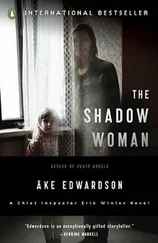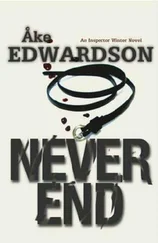“Are you going to do it, then?”
“She wanted to wait a day or two.”
“She? Does ‘she’ have a name?”
“Johanna.”
Angela didn’t say anything. He could tell she was thinking. He wasn’t sure what she was thinking.
“Johanna Osvald,” he said.
“Okay, okay,” she said.
She got up and took her cup out into the kitchen without saying anything.
He followed her. She was standing at the sink and looked like she didn’t know why.
“I haven’t actually seen her in twenty years,” he said.
“That’s too bad,” she said.
“Please, Angela,” he said.
She dropped the coffee cup on the counter. It bounced off the steel but didn’t break. It spun on the counter.
I will have to try to get out of this. Help her to get out of it too.
“Do you think I should call Steve?” he asked.
Angela turned around.
“What can he do?” she said. “And you said yourself that she wanted to wait.”
We’ll release it, he thought. Her dad will contact her in the morning. The letter to the “Osvald Family” is some kind of joke from the past. Maybe they’ve gotten some letters since the war, more of them. You never know.
He looked at the cup.
“It should have broken into a thousand pieces,” she said.
“Have the countertops gotten softer or have the coffee cups gotten harder?” he said.
Aneta Djanali drove to Anette’s former apartment before seven. Maybe she would have been named Anette herself if her parents had gotten it right. Was it Anette you were trying for? she had asked her mother once. Her mother had smiled in her African manner, a manner that Aneta had never really understood.
Her mother came from Koudougou, not so far from the capital. She could dance the hagra, alone when there really should have been a group of women singing and dancing to the tira flutes. It was wedding music, a wedding dance. Maybe that was why her mother had danced it. Aneta! We’re waiting for your wedding!
Aneta had records with hagra music; she could hardly keep moving with it. It was in her body, as it had been in her mother’s. She had a koso at home, the double-skinned drum, and the dried calabash filled with sand, the niabara, and the finger rings that were struck against each other in an eternal rhythm, boyo.
The houses shone in the remaining light of dusk. It had rained during the hour before dawn, and puddles had formed in the uneven asphalt. She saw women and children on the way to day-care centers or schools. She didn’t see any men. A delivery van went through a crossing on its way to a shopping center she couldn’t see.
She had a hunch.
She parked illegally on the cross street directly opposite the entrance. Her car was as anonymous as everything else before the morning begins in earnest.
The elevator mirror was missing. Despite that, she made a motion to fix her hair.
There was a smell in the stairwell from some kitchen or another.
The nameplate was still on the door.
She pushed down the door handle and the door slid open toward her. She could suddenly feel her pulse.
She opened the door a little more and saw a shadow. Then darkness.
It took a few seconds for her to understand. No one had touched her. The darkness was part of the room, the hall.
He had shut two doors, a sound she hadn’t heard. The light had suddenly disappeared when the doors closed. She heard him on the other side of the bedroom door. It wasn’t a pleasant sound. She felt the SIG Sauer in her belt, its weight against her hip, security.
He had no business there. That was the law and it was on her side; it stood here next to her in a black robe and white wig, an orb in its hand.
A fat shadow.
She just wanted to turn and leave this house. Leave quickly.
These people’s problems were not hers. And the problem wasn’t there anymore. The two of them had split up and gone their separate ways, or paths, to find happiness. There was happiness somewhere, maybe everywhere, like a promise to everyone: The grass is greener here, the sky is bluer.
Now she could hear a scream from inside. He hit the door, one, two, three. Soon she would be able to see the axe through the chips of plywood. After that, something that might look like Jack Nicholson’s crazy face. But there was no one here who could yell “Cut!”
If someone could, it would be her.
He opened the door, wild eyes, blank, no focus, until now.
“Who are you?”
“Police,” she said, and held her identification so he could see.
“Po… police? What are you doing here?”
“What are you doing here?” she said. “This isn’t your apartment.”
“My apartment? I lived here. I lived here, for fuck’s sake!”
“Not anymore,” said Aneta. “I must ask you to leave.”
Yes, she thought. I’ll do it this way. It could get messy otherwise. Unpleasant.
“I have no intention of going,” said Hans Forsblad.
“Do you want to come with me?” she said. “I could arrest you.”
“ You? ” He tried to laugh but it was a weak attempt. “How the hell would you manage that?” He took a step forward.
“ Stand still! ” shouted Aneta. Her weapon was in her hand, her arm straight out in front of her. No. But she was on her way there.
“Are you crazy?” he said.
He was close to her; he towered up over her like a shadow that was bigger than the shadow of the law, which was no longer visible. The only thing that was visible was the damned pistol she had been forced to draw. Or hadn’t been forced. She hoped that he wouldn’t see that it was trembling in her hand.
She waited for his next step. God, make me disappear. I don’t want to shoot this man. I don’t have time for that kind of investigation. He doesn’t have time. The health care system doesn’t have time. Only the funeral industry has time, eternal time.
She had him in her sight.
He sat on the floor, just collapsed.
He cried.
It was a loud noise, the same one she had heard through the door a moment ago. He lifted his head. They were real tears. His face was naked, his hair was like an ill-fitting wig, she could see now that he was wearing a suit that seemed expensive, of a label that managed to look more fashionable when it was wrinkled.
He blew his nose with the handkerchief that had been sticking out of his breast pocket. He’s not even missing that, she thought.
“You don’t know how it feels,” he said. “You don’t know what it’s like.”
Aneta had lowered her SIG Sauer but hadn’t replaced it in her holster.
“What?” she said.
“Being shut out of your own apartment,” he said, sniffling, “from your own home.”
“I heard that you haven’t lived here for a long time,” she said.
“Who said that?”
She didn’t answer.
“It’s them,” he said, focusing his gaze on the door behind her. “They’re the ones that said it. But they don’t know anything.”
“Who is they ?” she asked.
“Surely you know,” he said.
She put away her weapon. He followed her movement with his gaze.
“So I’m not under arrest anymore?” he said.
“Get up,” she said.
“You don’t know what it’s like,” he repeated.
Now he got up, swaying.
“May I leave?”
“How did you get in?” she asked.
He held up a key.
“The locks have been changed,” she said.
“That’s why I have this,” he said, waving the key in his hand. The tears were gone now.
“How did you get hold of it?” she asked.
“You must be able to figure that out,” he said. He had suddenly grown, straightened out.
Читать дальше












